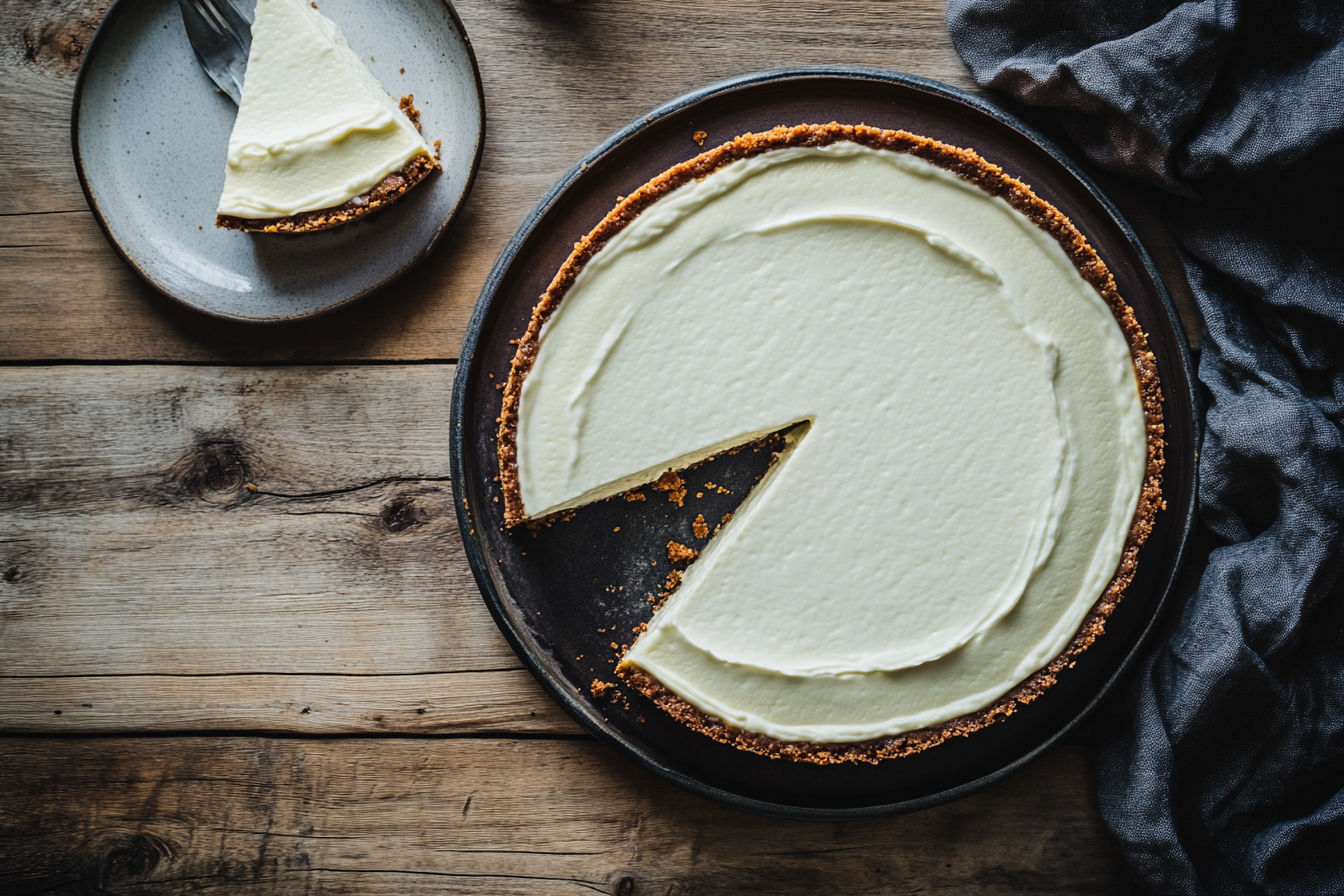If there’s one thing that makes life a little sweeter, it’s definitely cheesecake. Whether you’re celebrating a special occasion or simply indulging in a treat-yourself moment, cheesecake always delivers that creamy, rich goodness we all crave. However, here’s the million-dollar question: Which makes a creamier cheesecake—sour cream or Greek yogurt?
Interestingly, you might be surprised to know that both ingredients bring their own magic to the table. Sour cream is a staple in traditional cheesecake recipes, mainly known for adding richness and tangy flavor. In contrast, Greek yogurt has made its way into modern kitchens as a healthier substitute, boasting lower calories and fat, yet still delivering a fluffy, creamy texture.
So, naturally, which one is truly better for your cheesecake? Let’s dive deep into the world of cheesecake ingredients and ultimately figure out which one wins the crown for the creamiest, dreamiest dessert.
Traditional Cheesecake Ingredients: Where Sour Cream Fits In
Traditionally, cheesecake recipes almost always call for sour cream. For decades, it’s been the go-to ingredient, creating that smooth, rich texture we all know and love. The creamy thickness of sour cream blends seamlessly with the cream cheese base, thus offering a luxurious mouthfeel that’s hard to beat. Additionally, it provides that slight tang which perfectly balances the sweetness of the cheesecake.
Why Sour Cream?
- Richness: Sour cream’s high-fat content (around 20%) makes it a key player in creating that decadent texture.
- Tangy Flavor: It adds a slight acidity that cuts through the sweetness of the cheesecake, giving it a well-rounded flavor.
- Smooth Texture: Sour cream helps achieve a dense, velvety texture that many traditionalists can’t imagine cheesecake without.
When you’re aiming for the classic New York cheesecake experience, sour cream is often the ingredient of choice. But if you’re looking to shake things up a bit (or maybe save a few calories), let’s talk Greek yogurt.
Greek Yogurt in Cheesecake: A Healthier Twist
In recent years, Greek yogurt has taken the culinary world by storm, and it’s no surprise that it’s made its way into cheesecake recipes. If you’ve ever wondered whether yogurt could substitute for sour cream, the answer is a resounding yes! However, it’s not just any yogurt, but Greek yogurt specifically. It’s thick, tangy, and has a similar consistency to sour cream, although there are some notable differences.
Nutritional Benefits of Greek Yogurt:
- Lower Fat: Greek yogurt typically has less fat than sour cream, therefore making it a great option for those looking to reduce their fat intake.
- Higher Protein: Greek yogurt is packed with protein, so it serves as a healthier alternative that doesn’t sacrifice texture.
- Fewer Calories: When comparing sour cream and Greek yogurt, the latter often contains fewer calories, which is perfect for anyone watching their waistline.
If you’re curious for a deeper dive into the health advantages of yogurt, check out this fantastic guide on the Health Benefits of Yogurt. Spoiler alert: Yogurt wins in the health department!
Texture Showdown: Sour Cream vs. Greek Yogurt in Cheesecake
Here’s where things get interesting: the texture. When it comes to cheesecake, texture is everything. On one hand, some of us like it thick and dense (hello, New York-style lovers!), while on the other hand, others prefer a lighter, fluffier bite.
Sour Cream in Cheesecake:
- Dense and Creamy: Sour cream’s higher fat content creates a denser, richer cheesecake.
- Smooth Consistency: Furthermore, it helps the batter remain smooth, resulting in a cheesecake that’s soft yet firm, and holds its shape beautifully.
- Classic New York Texture: As a result, the classic dense texture that comes from using sour cream is what many associate with traditional cheesecake recipes.
Greek Yogurt in Cheesecake:
- Light and Fluffy: Greek yogurt lightens the cheesecake, making it airier and fluffier.
- Thinner Batter: The batter may seem a bit thinner than sour cream cheesecake, but once baked, it results in a creamy texture that feels lighter on the palate.
- Creamy with Less Guilt: You get the creaminess you crave, but with fewer calories and fat, making it a great option for those seeking a healthier dessert.
In short, if you love a thick and creamy cheesecake, sour cream might be your best bet. But if you’re looking for something a bit lighter and fluffier, Greek yogurt will do the trick.
Taste Comparison: The Tangy vs. Creamy Debate
Let’s not forget about flavor! Sour cream and Greek yogurt both bring something unique to the table when it comes to taste.
Sour Cream Cheesecake Flavor:
- Rich and Tangy: Sour cream has a pronounced tang that plays well with the sweetness of the cheesecake, adding depth of flavor.
- Balanced Sweetness: Its richness helps balance out the sweetness, ensuring the dessert isn’t too overwhelming.
- Perfect with Fruit Toppings: Sour cream’s flavor works particularly well with fruit-based toppings like strawberry or blueberry sauce.
Greek Yogurt Cheesecake Flavor:
- Milder Tang: While Greek yogurt still brings a bit of tanginess, it’s milder compared to sour cream. This makes it a great option if you want a cheesecake that isn’t as heavy on the palate.
- Creamy with a Hint of Sweetness: Greek yogurt also contributes a slightly sweeter undertone, which works well in cheesecakes that have sweeter, fruity toppings or swirls.
If you love pairing your cheesecake with tangy lemon zest or fresh fruit sauces, both options work wonderfully. For a richer, tangy bite, sour cream is the way to go. For a lighter, sweeter touch, Greek yogurt is the star.
Health Benefits of Yogurt Cheesecake: Why It’s a Better Option for Diet-Conscious Individuals

Now, let’s be honest—cheesecake is a treat. But if there’s a way to make it a little healthier without sacrificing too much of that creamy goodness, why not go for it?
Using Greek yogurt in cheesecake is like having your cake (or cheesecake) and eating it too. It’s lighter, packed with protein, and has fewer calories compared to its sour cream counterpart.
Key Health Benefits of Greek Yogurt in Cheesecake:
- Lower Calories: As mentioned earlier, Greek yogurt has fewer calories than sour cream, making it a great option for a lighter dessert.
- Higher Protein: Greek yogurt is known for being protein-packed, which can make your cheesecake a more filling, satisfying treat.
- Gut-Friendly Probiotics: Depending on the brand, Greek yogurt can also contain probiotics, which are great for gut health.
Looking for more healthy dessert ideas? Check out our collection of Easy gluten-free dessert recipes for some lighter alternatives that don’t compromise on flavor.
Yogurt vs. Sour Cream: Calorie and Fat Comparison
When it comes to calories and fat, there’s a clear winner: Greek yogurt. However, let’s break it down with a quick comparison.
Ingredient Comparison (per 100g):
| Ingredient | Calories | Fat | Protein |
|---|---|---|---|
| Sour Cream | 214 | 20g | 2g |
| Greek Yogurt | 59 | 0.4g | 10g |
As you can see, Greek yogurt not only has fewer calories and less fat, but it also packs a protein punch. Therefore, this makes it an excellent choice for those trying to lighten up their cheesecake without sacrificing that creamy texture.
For more information, if you’re interested in a deeper dive into how sour cream and yogurt compare in baking, check out this informative article on Sour Cream vs. Yogurt in Baking.
Substituting Sour Cream with Yogurt: Does It Work in All Cheesecake Recipes?
Now, you might be wondering if you can simply swap sour cream for yogurt in any cheesecake recipe. The answer is mostly yes, but there are a few important considerations to keep in mind.
Pros of Substituting Yogurt for Sour Cream:
- Healthier: As we’ve already covered, yogurt is a lower-calorie, higher-protein alternative.
- Lighter Texture: In addition, yogurt creates a lighter, fluffier cheesecake, which some may prefer.
- Versatility: Greek yogurt can easily be used in both baked and no-bake cheesecakes, making it quite versatile.
Cons:
- Thinner Batter: However, the batter might be a bit thinner, so you’ll need to keep an eye on the baking time.
- Milder Tang: If you’re a fan of that deep tang from sour cream, Greek yogurt’s milder flavor might not provide the same punch.
Ultimately, while yogurt works well in most cheesecake recipes, if you’re after a super-rich, dense dessert, sticking with sour cream might be your best bet.
Making the Perfect Yogurt Cheesecake: Step-by-Step Guide
Ready to give Greek yogurt cheesecake a try? Here’s a simple guide to get you started.
Ingredients:
- 2 cups Greek yogurt
- 16 oz cream cheese, softened
- 3/4 cup sugar
- 1 tsp vanilla extract
- 3 eggs
- Graham cracker crust (pre-made or homemade)
Instructions:
- Prepare the Crust: Crush graham crackers and mix with melted butter. Press into a springform pan and bake at 350°F (175°C) for 10 minutes. Let it cool.
- Make the Filling: Beat the softened cream cheese until smooth. Add Greek yogurt, sugar, and vanilla, and beat until combined. Add the eggs one at a time, mixing between each.
- Bake: Pour the mixture into the crust and bake at 325°F (160°C) for 50-60 minutes, or until the center is set but still jiggles slightly. Let cool completely before refrigerating.
For tips on achieving a smooth texture and avoiding cracks, keep ingredients at room temperature before mixing and avoid overbeating the batter. Also, cooling the cheesecake slowly in the oven with the door ajar can help prevent cracking.
Making a Sour Cream Cheesecake: Step-by-Step Guide
If you’re sticking to the classic, here’s how to make a rich and creamy sour cream cheesecake.
Ingredients:
- 16 oz cream cheese, softened
- 1 cup sour cream
- 1 cup sugar
- 1 tsp vanilla extract
- 3 eggs
- Graham cracker crust (pre-made or homemade)
Instructions:
- Prepare the Crust: Just like the yogurt version, prepare a graham cracker crust and bake.
- Make the Filling: Beat cream cheese until fluffy. Add sugar, sour cream, and vanilla, and mix well. Beat in eggs one at a time.
- Bake: Pour the filling into the crust and bake at 325°F (160°C) for 50-55 minutes, or until set. Let cool before chilling.
Pro tip: For a slightly tangier twist, add a teaspoon of lemon zest to the sour cream filling. It adds a refreshing contrast to the rich creaminess.
Lighter Cheesecake Options: Greek Yogurt for a Fluffy Texture
Looking for something even lighter? Greek yogurt shines in no-bake cheesecakes, offering a fluffy, mousse-like texture. It’s a fantastic alternative when you want something a little less rich but still packed with flavor.
You can find a delicious Mango Cheesecake No-Bake on our blog that uses yogurt for a refreshing, tropical twist.
Traditional Cheesecake Recipes vs. Modern Twists
In the world of cheesecake, you’ve got the traditionalists and the modern adventurers. Traditional cheesecake recipes rely on sour cream for that signature dense texture and rich flavor. But modern recipes have embraced the use of Greek yogurt, offering a lighter, more health-conscious alternative that doesn’t skimp on creaminess.
Ultimately, both versions have their merits, and the choice depends on your personal preferences and dietary goals. If you’re going for a classic cheesecake to impress at a dinner party, sour cream is your friend. If you’re looking for a lighter version to enjoy more often (without the guilt), Greek yogurt is your go-to.
Choosing the Best Dairy for Your Cheesecake Filling
So, what’s the best dairy for your cheesecake filling? It really depends on what you’re after.
- For Creaminess and Richness: Sour cream is unbeatable. It’s perfect if you want that thick, indulgent cheesecake.
- For Lightness and Health: Greek yogurt brings a lighter texture, fewer calories, and a protein boost, making it ideal for health-conscious bakers.
Conclusion: Which is Better for Your Cheesecake—Sour Cream or Yogurt?
In the great cheesecake debate, the winner is…both! It all depends on your personal preference. Sour cream is perfect for those who love a rich, dense cheesecake with a tangy twist. Meanwhile, Greek yogurt offers a lighter, fluffier texture with the added benefit of being lower in calories and higher in protein.
Why not try both and decide for yourself? Whether you’re a fan of the classic sour cream cheesecake or you’re curious about the healthier twist of Greek yogurt, there’s no wrong choice when cheesecake is involved.
FAQs: Common Questions About Sour Cream and Yogurt in Cheesecake
Can I use yogurt instead of sour cream in cheesecake?
Absolutely! Greek yogurt works as a great substitute for sour cream. It’s lighter and adds a mild tanginess, making it perfect for a fluffy cheesecake.
Does yogurt make cheesecake healthier than sour cream?
Yes, yogurt generally has fewer calories and less fat, while offering more protein. This makes it a healthier option for cheesecake without sacrificing too much of the creamy texture.
How do I avoid cracks when using yogurt in cheesecake?
To avoid cracks, use room temperature ingredients, avoid overmixing the batter, and allow the cheesecake to cool slowly in the oven after baking.
Which gives a tangier cheesecake, sour cream or yogurt?
Sour cream tends to give a tangier flavor compared to yogurt, which is milder. If you prefer a more pronounced tang, sour cream is your best bet.
Can I make a gluten-free cheesecake with yogurt or sour cream?
Yes! Simply use a gluten-free graham cracker crust or almond meal crust. For more ideas, check out our Blackberry Cheesecake Recipe which could easily be adapted with gluten-free ingredients.
And there you have it! Whether you’re team sour cream or team Greek yogurt, the world of cheesecake is yours to explore. Happy baking!

